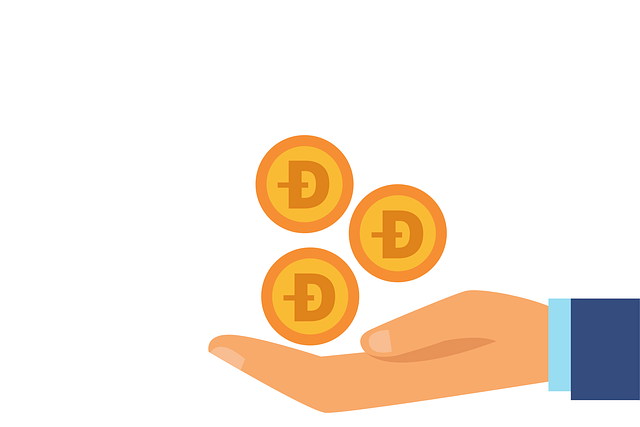Dogecoin (DOGE) has emerged as a legitimate e-commerce payment option, evolving from a joke cryptocurrency to a popular choice due to its rapid processing times, low fees, and supportive community. Integrated on several platforms, Dogecoin gained early traction when Overstock became the first major retailer to accept it in 2014, leading to increased sales and positive customer feedback. Small businesses and startups have successfully adopted Dogecoin, expanding their customer bases and increasing sales due to its decentralized nature and low fees. Integrating DOGE requires robust security measures to build consumer trust, while challenges like transaction security, regulatory compliance, and price volatility can be overcome through blockchain integration and partnerships with established crypto processors. With cross-border payment potential and growing popularity, Dogecoin is poised to become a leading player in the e-commerce payments space, offering a user-friendly digital currency for global online shoppers.
“Discover how Dogecoin, once a meme currency, has evolved into a powerful payment option in e-commerce. This article explores Dogecoin’s rise and its significant impact on online retail. We delve into case studies like Overstock’s early adoption success, analyze its effect on small businesses, and discuss crucial security measures for transactions. Additionally, we examine integration challenges faced by online retailers and predict Dogecoin’s future prospects in the global e-commerce market, highlighting its potential as a leading digital payment method.”
- Dogecoin's Emergence as a Payment Option in E-Commerce
- Case Study: Overstock – Early Adoption and Success Story
- The Impact of Dogecoin on Small Businesses and Startups
- Security and Fraud Prevention Measures for Dogecoin Transactions
- Integration Challenges and Solutions for Online Retailers
- Future Prospects: Dogecoin's Potential in the Global E-Commerce Market
Dogecoin's Emergence as a Payment Option in E-Commerce

Dogecoin’s emergence as a payment option in e-commerce is a fascinating development that has captured the attention of both tech enthusiasts and merchants worldwide. Born as a lighthearted meme coin in 2013, Dogecoin quickly evolved from its playful origins to become a viable digital currency with a dedicated community. The coin’s rapid growth and widespread adoption can be attributed to several factors, including its fast transaction times, low fees, and the supportive and active online community that has propelled its popularity.
This surge in popularity has directly translated into Dogecoin’s integration as a payment method by numerous e-commerce platforms. Businesses are recognizing the potential of this cryptocurrency to offer faster, more cost-effective transactions for their customers. With a focus on accessibility and user-friendliness, Dogecoin provides an alternative to traditional payment methods, attracting tech-savvy shoppers who appreciate the convenience and security that blockchain technology offers.
Case Study: Overstock – Early Adoption and Success Story

Overstock, an online retailer known for its commitment to embracing new technologies, was one of the first major e-commerce platforms to adopt Dogecoin (DOGE) as a payment method in 2014. This bold move not only showcased the brand’s forward-thinking approach but also sparked significant interest in cryptocurrency among both customers and industry peers. The integration process was seamless, allowing users to purchase items using their DOGE wallets with ease.
The success of this partnership was evident in the increased sales and positive customer feedback. Overstock’s decision to accept Dogecoin demonstrated the potential for cryptocurrencies to revolutionize e-commerce transactions by providing fast, secure, and cost-effective payment solutions. This early adoption has solidified Overstock’s position as a trailblazer in the industry, paving the way for other online businesses to follow suit and embrace the benefits of DOGE and other digital currencies.
The Impact of Dogecoin on Small Businesses and Startups

Dogecoin’s emergence as a viable payment option has had a profound impact on small businesses and startups, opening up new avenues for growth and expansion. Its decentralized nature and low transaction fees make it an attractive alternative to traditional payment gateways, empowering entrepreneurs to compete in the digital marketplace. This cryptocurrency offers a level playing field, where smaller operations can efficiently process payments without incurring high processing costs.
Case studies reveal that many small businesses have successfully integrated Dogecoin into their e-commerce platforms, leading to increased customer base and sales. The flexibility of Dogecoin allows merchants to cater to a global audience, transcending geographical boundaries. Moreover, the community aspect of Dogecoin fosters a sense of loyalty among users, providing startups with a dedicated customer base that appreciates the unique, inclusive nature of this digital currency.
Security and Fraud Prevention Measures for Dogecoin Transactions

When integrating Dogecoin (DOGE) into e-commerce platforms, ensuring robust security and fraud prevention mechanisms is paramount to building consumer trust. DOGE transactions, like any cryptocurrency, are vulnerable to various security threats, including phishing, hacking, and scams. E-commerce businesses adopting DOGE should implement strong authentication methods such as two-factor authentication (2FA) for user accounts and smart contract audits to verify the integrity of transaction codes.
Advanced anti-fraud systems, including real-time transaction monitoring and anomaly detection algorithms, can help identify suspicious activities. Additionally, utilizing hardware wallets for secure storage and off-chain transaction channels can further mitigate risks. By employing these security measures, e-commerce platforms can foster a safe environment for DOGE transactions, encouraging wider adoption and fostering consumer confidence in this innovative payment method.
Integration Challenges and Solutions for Online Retailers

Many online retailers are exploring Dogecoin as a payment option, but integrating this cryptocurrency poses unique challenges. One significant hurdle is ensuring secure and efficient transactions while adhering to regulatory compliance. Additionally, retailers must consider the volatility of Dogecoin’s value, which can impact customer experience and profit margins.
To overcome these challenges, retailers can implement robust security measures such as blockchain integration and partnerships with established crypto payment processors. Implementing real-time exchange rates and offering flexible conversion options for customers can mitigate price volatility concerns. Moreover, providing clear communication about the benefits and risks associated with Dogecoin payments can foster trust and educate consumers.
Future Prospects: Dogecoin's Potential in the Global E-Commerce Market

As e-commerce continues to grow globally, the future prospects for Dogecoin’s adoption in this sector look promising. Its low transaction fees and fast processing times make it an attractive option for cross-border payments, especially in regions with underbanked populations. With its increasing popularity and a dedicated community of users, Dogecoin has the potential to disrupt traditional payment gateways and become a preferred method for online transactions worldwide.
The global e-commerce market’s shift towards faster, more cost-effective payment solutions creates an ideal environment for Dogecoin’s integration. Many e-commerce platforms are already exploring blockchain technology and cryptocurrency payments, recognizing their benefits in terms of security, transparency, and efficiency. With further development and growing support, Dogecoin could become a leading player in this space, offering a user-friendly and accessible digital currency for online shoppers worldwide.
Dogecoin’s growing adoption in e-commerce, as evidenced by case studies like Overstock’s success and its positive impact on small businesses, underscores its potential as a viable payment option. Despite challenges in integration and security concerns, the rise of Dogecoin indicates a promising future for global e-commerce. As online retailers navigate these hurdles, the cryptocurrency’s accessibility and community support could revolutionize digital transactions, making it an exciting game-changer in the dynamic world of e-commerce.








Leave a Reply
You must be logged in to post a comment.